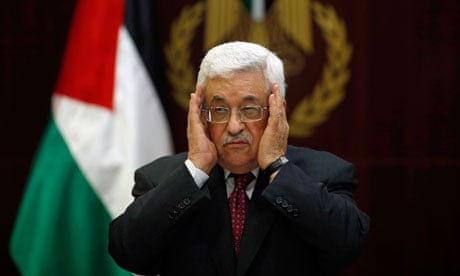Israel has been accused of medical negligence by the Palestinian president and prime minister after the death of a prisoner from cancer, which triggered triggering clashes in the West Bank and protests by Palestinian inmates in at least four Israeli jails.
Maysara Abu Hamdiyeh, 64, died on Tuesday morning, three days after being transferred to Soroka hospital in the Israeli city of Beersheva.
After news of his death Israeli prison guards used teargas in response to protests by hundreds of Palestinian prisoners, who banged on cell doors, started fires and threw objects. Three prisoners and six guards needed medical treatment, according to the Israeli Prisons Service. A three-day hunger strike by Palestinian security prisoners was announced.
There were also clashes in the tense West Bank city of Hebron, where Abu Hamdiyeh lived. Protesters threw rocks and firebombs, according to reports.
President Mahmoud Abbas told reporters in Ramallah: "The death of Maysara Abu Hamdiyeh shows the Israeli government's arrogance and intransigence over the prisoners. We tried to get him released for treatment but the Israeli government refused to let him out, which led to his death."
Prime minister Salam Fayyad issued a statement condemningIsrael's "policy of medical negligence against Palestinian prisoners".
Abu Hamdiyeh, who was sentenced to life in prison in 2002 for attempted murder, was diagnosed with cancer of the oesophagus in January, more than four months after complaining of severe throat pain. By the time he was transferred to hospital cancer had spread to his spinal cord. According to his lawyer, he had lost significant weight and, until his admission to hospital, had been treated only with painkillers.
According to Jawad Paulis, of the Palestinian Prisoners' Club, who said he visited Abu Hamdiyeh in hospital two days before his death, the prisoner's hands and feet were bound. The Israeli Prison Service (IPS) neither confirmed nor denied the use of shackles.
Issa Qaraqe, the Palestinian Authority prisoners minister, said Abu Hamdiyeh's cancer spread because he did not receive treatment earlier.
"The prison administration knew that he was suffering from cancer and they didn't release him and medically neglected him," Qaraqe told the Palestinian news agency Ma'an.
Sivan Weizman, spokeswoman of the IPS, said it had initiated moves to get Abu Hamdiyeh released on compassionate grounds after his cancer was diagnosed as terminal last week. "Usually it takes a few weeks to complete," she said.
A statement from the IPS said: "The prisoner was diagnosed with oesophageal cancer in February and was under the medical supervision of experts at the hospital.
"About a week ago, after being diagnosed as terminal, the ISP appealed to the release committee to secure his early release, a process which had been started but not yet concluded."
The issue of prisoners' rights has widespread resonance in Palestinian society, where most families have experience of relatives in jail.
There are currently at least three prisoners on long-term hunger strike. Samer al-Issawi has been refusing food for long periods since last August after he was arrested for allegedly transgressing the terms of his release from a 30-year sentence in October 2011 under the prisoner swap deal which saw Israeli soldier Gilad Shalit freed after more than five years in captivity.
His weight has halved to 45kg and he is reported to be in a critical condition in Kaplan hospital in Tel Aviv. According to Addameer, a Palestinian prisoners' rights group, the Israeli authorities are pressuring Issawi to accept a deal under which he will be released but deported to Gaza, which it says is forcible transfer and illegal under international law.
"Samer's life is in danger and I am told that at any minute his heart could stop," his mother Laila, 65, told the Guardian. "He has become a symbol of defiance."
Younis al-Hroub has been on total hunger strike since 19 February in protest at his "administrative detention" without charge or trial since last July. He is currently in Soroka hospital, shackled to a bed, according to Addameer. Another administrative detainee, Samer al-Barq, has been refusing food since the end of February.
According to the Palestinian Authority, 25 Palestinian prisoners in Israeli jails have cancer. At least 1,500 prisoners are in ill health and suffering from medical negligence, it claims. There are about 4,800 Palestinians in Israeli prisons and detention centres, including 178 administrative detainees.
